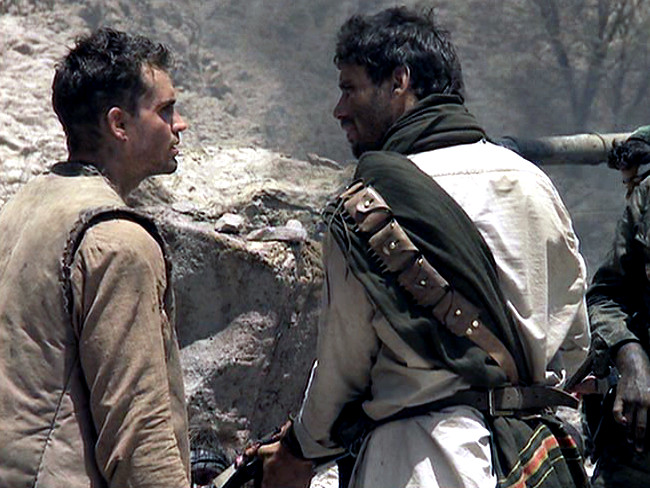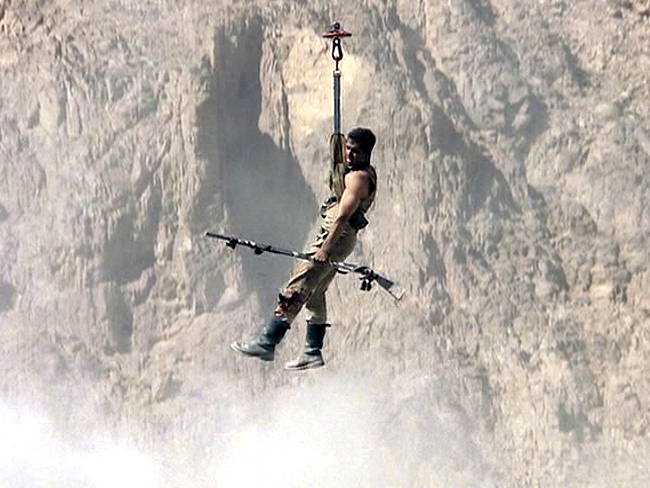The Beast (1988) is the greatest contemporary mainstream war movie in existence. "Mainstream" is a little deceptive, as it perhaps falls neither within the mainstream nor the underground categories, & this its place in the annals o' film history being unclear positions it in a strange geography.
The Beast has all the makings of a big budget flick, though it fails in a number of key aspects: its lead actours command respectable, albeit long-faded, star-power; it likewise avoids all bathetic emotionalism in which even the most critically-acclaimed pieces (Saving Private Ryan, e.g.) cannot help indulging, mostly preferring, e.g., a minimalist, semi-avant-garde assortment o' cues which serve all-around to increase its oppressive circumambience, or favouring terse, substance-fraught dialogue over heart-string-pulling quotables. It performs this--let's call it a--tight-rope act which never takes a plunge into the abstract abysses in which The Thin Red Line, Apocalypse Now, Der Hauptmann, & Idi i smotri gleefully lose their expression. Naturally, The Beast's weaknesses reveal themselves to be its strengths.
After having weathered the storm o' a limited release in theatres, which was prompted by a change o' studio leadership at Columbia Pictures, & relative obscurity, The Beast's thematic elements have not lost their sheen after my repeated viewings over the course o' nearly two decades. At the center o' this thematic plane, frome which all other its Spiritual brethren are emitted, is juste this idea of possessing a home, to which my & the proceeding generations will relate.
The halcyon landscapes of The Beast's opening strongly hint at this its being about home. But, notwithstanding all this home's natural ecosystem being haunted by the natural order, & its simple domesticity, this bird's-eye view of being about home is complicated by the Soviets' mechanical bears, the symbol fore industrialised might, penetrating its being relatively disconnected frome the outside world, i.e., us. Together with home, it is a way-o'-life at stake here, & so this "idealism" which is the stable, picturesque image o' the natural manifold at rest gives way to the sobering reality of juste that very nature's determinations colliding in perpetuity.
Khan Taj Mohamed & Konstantin Koverchenko:
The Beast's two leads, Khan Taj Mohamed, whose title "khan" connotes & denotes royal prerogative, & whose name "Taj" comes frome the Sanskrit meaning "crown", & Konstantin Koverchenko1, whose hypocoristic element represents "being constant", are the refracted manifestation of juste what this nature's determinations colliding in perpetuity means in actuality.2 (I have briefly written on the significance of "determination" & "natural manifold" elsewhere) That is to say, the refractive point of this natural manifold, allowing it to become intelligible to us, is the splitting of this idea of "being about home" in The Beast's two leads. I have similarly observed a rhyming characterisation even in The Dark Backward. What, in effect, occurs is the birth of each other's identity from a single idea, but a re-unification of the two would similarly erase those identities, since neither would be themselves anymore. Given that Koverchenko "thinks fore himself", & thus poisons the cohesiveness of Daskal's command, his speechless abandonment of Taj in the film's bittersweet conclusion essentially speaks to his being homesick for a life radically different from the latter's. Likewise, Taj's "thinking for himself", as evidenced by sparing Koverchenko's life when he is bound to a rock, & also by his willingness to entrust Koverchenko over their cooperation's lifespan, actively prevents Moustafa frome sniping the Russian.

|
| Taj asks Koverchenko if he is an angel or a demon. |
Now, Taj's liberation from hard-lined Pashtun tribalism, even if or as it is for the time being, or what is the same thing, Taj's entrance into & being subjected to the free play of the natural manifold, which is juste this negativity, a moment which is symbolically marked by Akbar's death, is the fulfillment of his wish to have a man to "tear apart" & to become the stone for Allah's sling, an image which is later reincorporated as Koverchenko's being tied to a rock. Taj's liberation is juste this his religion being raised from the merely personal, pre-conscious, & blind-faith variety to a concrete one in which every body plays a role in the observer (Taj's) eyes, & which is this organic unity/infinity which in truth preserves its self-differentiation at the expense of identity-based politicking. Taj's liberation is the forme of his religion being filled accordingly with content, & this "is" is juste this his willful identification or equation with Allah being rendered explicit, or Spirit being made real.
Now, Koverchenko's capability of being more than juste behaving in accordance with Soviet military law, i.e., thinking fore himself, is the basis for not juste his eventual defexion, but also his & Samad's friendship & his being at philosophical loggerheads with Daskal's command. Juste as Taj is liberated from Pashtun tribalism, Koverchenko likewise becomes so completely alienated frome "giving to the motherland" as to entertain surrender. But, since he finds himself in "Afghanistan", a hostile territoury, he finds himself lost & without a country. Thinking fore himself has undermined, or rather has complicated, Koverchenko's loyalties in the time preceding his encounter with Taj. This is communicated to us by this his Spiritless partaking in the village's ransacking, the reluctance he shows when Daskal orders him to crush Shahzaman, his being receptive to the nuances of Pakhtunali, his befriending of Samad, his refusing to "take out" Samad on Daskal's suspicion that the former is a traitour . . . & being ex-communicated has only completed this defexion, in that this defexion is taken up in the image o' being tied to a rock, which is juste this formal being unwillingly enslaved to Soviet ideology with actual content, or it is made explicit to Koverchenko, this Soviet ideology which imagines the real "Afghanistan" as a country whose natural cartography is in truth represented by the artificiality emplaced by western cartographers & whose people's loyalty revolves around a centralised governing body, i.e., Kabul.
Koverchenko's Soviet mindset has been rendered asunder at this critical moment, & for that reason gives way to the free play of the natural manifold, which takes up the character of juste this natural mainfold's pure negativity, which itself comes into being through the multiplicity of ethno-centric loyalties, & therefore in-fighting, that "Afghanistan" contains as a result of the region's historico-natural development. As Naby writes, "No ethnic group in Afghanistan lives in or inhabits Afghanistan exclusively. None but the Pashtuns . . . claim Afghanistan as their chief area of habitation" (239).3 Even between Taj and his cousin, Moustafa, will this conception of a united "Afghanistan" fail. As the latter says, albeit strategically, "Cousin, uncle, we are tired of this ancient vendetta", but even so, Taj is distrustful of Moustafa's motives; Moustafa who lives by this:
| quote: |
| I always said, have faith in Allah and keep a hidden pistol. |
This division of peoples that is "Afghanistan" is once again brought up by Moustafa when he says:
| quote: |
| One of the tanks that killed your people is lost in the Valley of the Jackal (emphasis mine). |
Also:
| quote: |
| Let us take revenge together . . . We divide the booty (emphasis mine). |
This free play of the natural manifold is juste this internal in-fighting that consumes Koverchenko as he journeys deeper & deeper into the mouth of the Valley of the Jackal, & which is shrewdly cognised by Taj after encountering the former. Juste as Taj honours Moustafa's truce, so too does he enact another between himself & Koverchenko, this in spite of his brothers-in-arms's protestations, but this enacting is juste this recognition of the other as an independent self-consciousness that retains its individuality, or what is the same thing, thinking for itself, even if it remains within the sphere of the infinity which is juste this natural manifold of concerted multiplicities. But their efforts being combined never-the-less preserves these differences & erases their respective identities at once.
This working together is as much the erasure of "Taj" & "Koverchenko" as it is the erasure of "Afghanistan" &"Russia", the temporary dissolution of all cartographic fixity & this stability's being raised to the level of amorphous Spirit. The truth is, the natural manifold conditions individuals to behave self-centeredly & become divided in some manner, but at the same time demands the unity of otherness in general, & so this confederation between Taj & Koverchenko is temporary at best. It juste so happens that "Afghanistan" retains much of & has developed nearer to the natural manifold's baseline & ever-present state, in the same manner that "Germany" was the "German Confederation" prior to the Franco-Prussian War, & so here we understand the idea of "being a developed nation" as the measure of one or many peoples' containment of this natural manifold's influence. The Russian tank represents this being shelled-in from the outer elements, & as the Holy Man proclaims after its being rendered immobile:
| quote: |
| Goliath was covered with armor, but just a rock brought him down. |
The prophecy of Taj and Koverchenko's being coordinated in their efforts, which is juste this natural manifold's negative power coming into being, is thus fulfilled.
Now, to bring it back home, once Taj and Koverchenko have disbanded in the end, the latter finds his Spiritual home, & the former has successfully upheld the legitimacy of that very same home. But, since they have disbanded, which marks the reinstatement of their nostalgia for their original motherlands, in order to live happily they must go their separate ways, but not without bearing the marks of what was juste moments ago the fusion & preservation of self-differentiation.

|
| As Koverchenko is raised by the helicopter, Khan Taj Mohamed gets his answer. |
Koverchenko may as well stay with Taj, true, but I think it would have reduced him to a not being true to himself. This Spiritual home which he has juste found individually does not truly correspond only within the borders carving out Afghanistan; as a matter o' fact, this Spiritual home is without borders & is every physical coordinate imaginable, but the manageability involved in this Spiritual home which is the suspension of borders, & which in Spirit temporarily contains this natural manifold's unending process of development, because people are constituted in the manner that they are, is untenable & beyond the full grasp of human domesticity. Borders exist fore a reason, & that reason is the general rationality with which individuals stabilise the forces of nature beneath which individuals are constantly subjected.
Of Koverchenko, Moustafa says,
| quote: |
| He will always be Russian. |
Since he will always be Russian, Russia will always be pulling at Koverchenko's heart, & things will never be "right" like the "right" turn initiating his journey into the mouth of the Valley of the Jackal, i.e., his freedom. It is Soviet ideology, not Russia itself, which attempts to remove the agency of his Spirit, & "Russia itself" is, juste as "Afghanistan" or the "United States" is, juste this Spiritual home concealing itself with the mask of a nation fore the sake of our being able rationally to navigate its labyrinthine corridours.
Originally published on Wed Aug 12 23:00:46 2020, & last updated on Thu Aug 20 16:22:04 2020